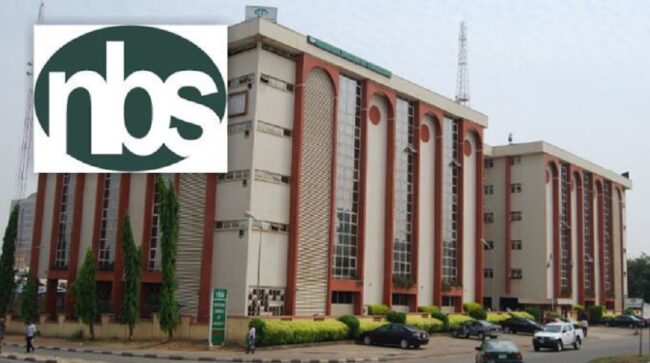The National Bureau of Statistics (NBS) has disclosed in its Nigeria Labour Force Survey (NLFS) for Q2 2023, released in Abuja on Thursday, that Nigeria’s unemployment rate rose to 4.2 per cent in the second quarter of 2023 (Q2 2023).
The NBS defined the unemployment rate as the share of the labour force that was not employed but was actively searching and was available for work.
The report put the unemployment rate among persons with post-secondary education at 8.0 per cent in Q2 2023.
The NBS said, “Those with upper secondary education were 5.4 per cent, while those with lower secondary education were 3.7 per cent, 3.0 per cent for those with primary education, and 2.5 per cent for those with no formal education.”
Further, it stated that the unemployment rate among youth aged 15–24 years in Q2 2023 was 7.2 per cent compared to the 6.9 per cent recorded in Q1 2023, while the unemployment rate among men was 3.5 per cent and 5.9 per cent among women in Q2 2023.
According to the NBS, “the unemployment rate in urban areas was 5.9 per cent in Q2 2023, which was an increase from the 5.4 per cent recorded in Q1 2023. While the unemployment rate in rural areas was 2.5 per cent in Q2 2023, which was a decline from the 2.9 per cent recorded in Q1 2023,
It highlighted that time-related underemployment in Q2 2023 was 11.8 per cent compared to 12.2 per cent recorded in Q1 2023, explaining the time-related underemployment rate as the share of employed people who were working less than 40 hours per week but who would be willing and available to work more.
It also added that the labour force participation rate measures the share of a country’s working-age population. the population that is in the labour force, while the labour force is the combination of those
individuals who are employed and those who are unemployed.
“In Q2 2023, the labour force participation rate in Nigeria was 80.4 per cent, having been 79.9 per cent in Q1 2023. The Q2 2023 participation rate among men was 82.1 per cent, while for women, the participation rate was 78.8 per cent. The participation rate was 78.4 per cent in urban areas and 82.6 per cent in rural areas,” the report finds.
The highlight of the report shows that “The labour force participation rate among the working-age population
remained high at 80.4 per cent in Q2 2023. The employment-to-population ratio was 77.1 per cent in Q2 2023.
“The combined rate of unemployment and time-related underemployment as a share of the labour force population (LU2) was 15.5 per cent in Q2 2023. Most workers (around 88.0%) were in self-employment in Q2 2023. The proportion of workers in wage employment in Q2 2023 was 12%. The unemployment rate in Q2 2023 was 4.2%; this is an increase of 0.1% from the figure recorded in Q1 2023 (4.1%).
“The rate of unemployment among persons with post-secondary education was 8% in Q2 2023. The unemployment rate among youth aged 15–24 years in Q2 2023 was 7.2%, having been at 6.9% in Q1 2023. The unemployment rate in urban areas was 5.9% in Q2 2023, an increase from 5.4% in Q1 2023.
“Time-related underemployment in Q2 2023 was 11.8%, and 4.8% of the working-age population were in subsistence agriculture. The informal employment rate in Q2 2023 was 92.7%. The percentage of youth not in Employment, Education or Training (NEET) rate was 13.8%”.
The NBS explained that this is the third quarter of results since it revised and improved its methodology for collecting labour market statistics in Nigeria and that the new methodology now aligns with internationally agreed standards and guidelines.
It stressed that labour market statistics are among the most important economic indicators, and this makes the regular conduct of the Nigeria Labour Force Survey (NLFS) crucial, noting that the NLFS is designed to gather key labour market statistics to support government policies and programmes for more effective planning.
The survey, it added, provides up-to-date information on the dynamics of the labour market.
market in the country, as reliable labour market data can provide valuable insights about the economy for businesses and investors and can help in the design of sound economic policies to address the challenge of creating productive jobs and eliminating poverty; this can ultimately enhance the overall stability of the economy.
Labour is one of the most important factors in production and is a major determinant of the economic system globally. That is why it is imperative to know whether people are working or not, how long they work, and the nature of the jobs in which they are engaged.
The NLFS enables key labour market statistics and the employment situation to be monitored periodically in Nigeria.
The NLFS aims to provide insight into the Nigerian economy, indicators for policy formulation, and a base for international comparison.
“The results presented here are based on the resolutions concerning statistics of work, employment, and underutilization from the 19th International Conference of Labour Statisticians (ICLS 2013),” the NBS said.
YOU SHOULD NOT MISS THESE HEADLINES FROM TheWitness
How I helped Peter Obi overcome impeachment plot as Anambra governor — Sowore
Self-styled human rights activist, Omoyele Sowore has revealed an age-long secret about Peter Obi, the Labour Party presidential candidate in…
Yuletides: Low-key Christmas looms as poultry birds price rise than last years’
In less than 10 days to Christmas, the price of poultry birds in Ibadan is projected to be higher than last year mostly because of…
Comedian Mark Angel apologises over Emanuella’s viral dance video
Nigerian comedian Mark Angel has issued an apology following the circulation of a viral video featuring his…
I learnt about the use of human head for money rituals on Facebook —Man who beheaded OAU student in Abeokuta
A 35-year-old suspect, Akeem, who was arrested by detectives in Ogun State Police Command after…
Top 13 facts about Buhari at 81
As he marks his 81st birthday on Sunday December 17th, roughly six months after the completion of his two terms as…
CAF crowns Nigeria’s Osimhen African Player of the Year
Super Eagles striker, Victor Osimhen, has been crowned the African Player of the Year 2023 by the Confederation of…







